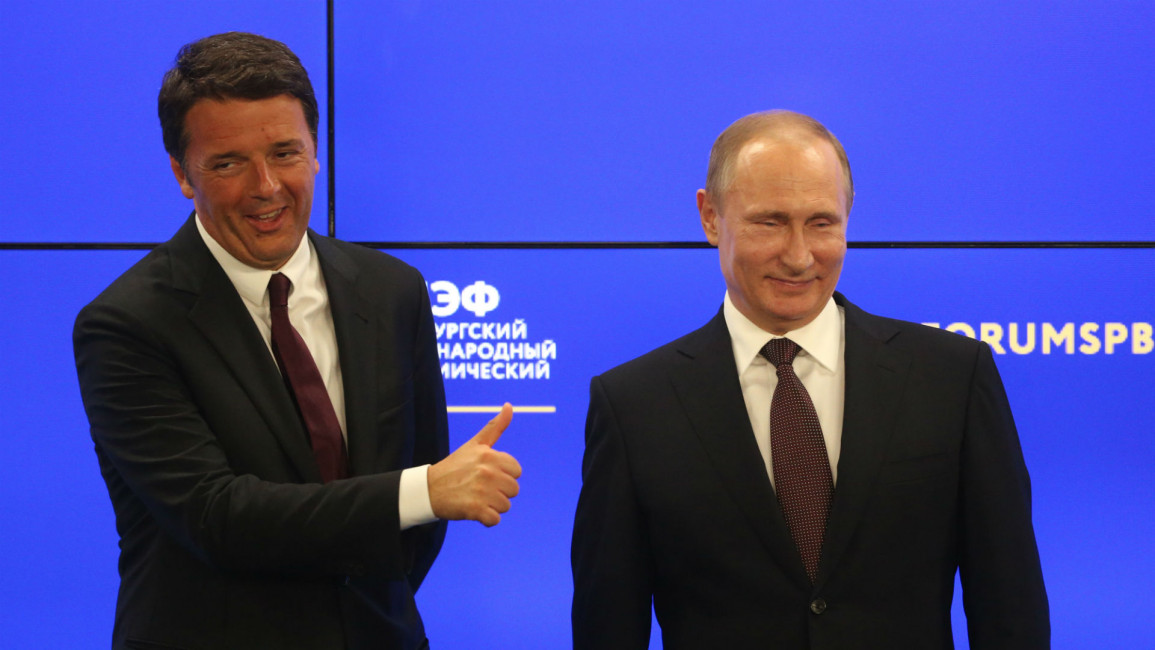Italy blocks European sanctions against Russia over Aleppo
Italy blocks European sanctions against Russia over Aleppo
The Italian prime minister prevented the European Council from publishing a call for sanctions against Russia in a nine-hour meeting in Brussels.
2 min read
Renzi has had a changeable relationship with Russia's Putin [Getty]
Italian Prime Minister Matteo Renzi successfully removed the word "sanctions" from a European Council proposal on Russia in Brussels, during a meeting yesterday.
Renzi repeatedly railed against plans by UK, Germany and France to push for further sanctions against Moscow in response to Russia's repeated attacks on civilians in Syria.
"I think that to refer in the text to sanctions makes no sense," said Renzi.
The European Council communique on external relations makes specific criticism of Russia's involvement in the Syrian civil war, but stops short of recommending any action.
"The European Council strongly condemns the attacks by the Syrian regime and its allies, notably Russia, on civilians in Aleppo," the missive said.
The communique also maintains that inaction will not remain forever.
"The EU is considering all available options, should the current atrocities continue," it said.
This is not the first time that Renzi has voted against sanctions on Russia, having twice voted against an extension of sanctions in October 2015.
There is a growing feeling among some EU members that sanctions against Russia might backfire and spark a growing conflict with their eastern neighbour.
Supporters of sanctions believe that the only response that will effect any change from the Kremlin is the policy of "containment", whereby economic damage can and will lead to a shift in policy.
"Inaction is just so unbelieveable," said Saskia Baas, an academic at the University of Amsterdam who has been pushing for sanctions.
"We're calling on Russia to stop slaughtering people, but I don't see these calls resulting in any alleviation of suffering in Aleppo.
"There's meeting after meeting but no real action comes out of these meetings."
Around a third of EU members expressed reservations against sanctions at the meeting, with Spain, Greece and Austria voicing objections.
Renzi repeatedly railed against plans by UK, Germany and France to push for further sanctions against Moscow in response to Russia's repeated attacks on civilians in Syria.
"I think that to refer in the text to sanctions makes no sense," said Renzi.
The European Council communique on external relations makes specific criticism of Russia's involvement in the Syrian civil war, but stops short of recommending any action.
"The European Council strongly condemns the attacks by the Syrian regime and its allies, notably Russia, on civilians in Aleppo," the missive said.
| Read more: Few takers for Russian 'humanitarian corridor' out of Aleppo |
The communique also maintains that inaction will not remain forever.
"The EU is considering all available options, should the current atrocities continue," it said.
This is not the first time that Renzi has voted against sanctions on Russia, having twice voted against an extension of sanctions in October 2015.
There is a growing feeling among some EU members that sanctions against Russia might backfire and spark a growing conflict with their eastern neighbour.
Supporters of sanctions believe that the only response that will effect any change from the Kremlin is the policy of "containment", whereby economic damage can and will lead to a shift in policy.
"Inaction is just so unbelieveable," said Saskia Baas, an academic at the University of Amsterdam who has been pushing for sanctions.
"We're calling on Russia to stop slaughtering people, but I don't see these calls resulting in any alleviation of suffering in Aleppo.
"There's meeting after meeting but no real action comes out of these meetings."
Around a third of EU members expressed reservations against sanctions at the meeting, with Spain, Greece and Austria voicing objections.



